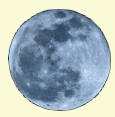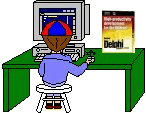What's New - July, 2012
[Home]
July 6, 2012:
 Back to work after a break for the holiday.
Blue Moons, a program which calculates
occurrences of full moons which are called "blue" even though they are not.
There is speculation that the Middle English word for "blue" which also meant
"betrayer", used that meaning because the occurrence of 13 lunar months in some
years messed up their use for agricultural and religious purposes. In any
event, the phrase "Once in a blue moon" in English indicates an event or
condition that rarely occurs. There are two common definitions and
the program provides results for both.
Back to work after a break for the holiday.
Blue Moons, a program which calculates
occurrences of full moons which are called "blue" even though they are not.
There is speculation that the Middle English word for "blue" which also meant
"betrayer", used that meaning because the occurrence of 13 lunar months in some
years messed up their use for agricultural and religious purposes. In any
event, the phrase "Once in a blue moon" in English indicates an event or
condition that rarely occurs. There are two common definitions and
the program provides results for both.
July 15, 2012: A viewer recently suggested that I build a CD each quarter with all downloadable program files and offer it on a subscription basis as a way for users to always have the latest versions of everything. I'm considering the idea, but it raised the question of the size of those files to be included and the idea to write a file scanner program. I soon realized that we already have a program to copy files matching a file mask in a selected folder which almost does the job. Copy Folder Test Version 3.1 adds the option to report counts and sizes of selected files without copying. It also fixes a couple of other problems including "Web Site" directories being excluded in Delphi's class which lists directories and misreporting sizes for files larger than 4GB.
July 28, 2012: My one-week project in "syllabizing" (aka "syllabication", aka syllabification) turned into a two week project and could easily have been a month. The definitions and rules are man-made, not "nature-made" which always leads to complexity. The program posted today, Syllables Version 3 syllabizes words from DFF's largest dictionary (Full,dic, 63,000 words) by matching them against a large publicly available syllabized word file 180,000 words. Actually only 40,000 words were matched from that source, another 20,000 were generated one of two ways:
-
Looking for compound words, i.e. trying to split the word into two parts each of which we know how to syllabize and then putting the pieces back together with an extra syllable marker between the words; or -
-
By rules within the program which removes prefixes or suffixes, matches the base word against a known syllabized format and them adds the prefix or suffix back, adding 0,1, or 2 extra syllables.
When neither of those matches resolve how to syllabize, the final method is to manually create a syllabized entry in an update file, currently with about 600 entries. The update file is automatically added to the syllable data base each time it changes.
Working with syllables resulted in changes to three other word related areas of DFF:
-
The medium dictionary (General.dic) and large (Full.dic) dictionaries both contained a number of foreign words abbreviations which were not identified as such and did not have entries in the Gutenberg reference file. Rather than manually syllabize those entries, I correctly identified them in the dictionaries and then skipped trying to syllabize foreign words and abbreviations when testing the system. The updated dictionaries are available in revised file Dictionaries.zip .
-
The program used to update the dictionaries was corrected to expand the display area to show all of longer words whose display was previously truncated. Also corrected a program crash when attempting to add a zero length word. Revised versions of both DicMaint executable and DicMaint source are now available.
-
Finally, the Syllables program crashed if an attempt was made to check all words in a dictionary when the dictionary wasn't available. A change to the UDict dictionary unit now politely informs the user that he cannot do that. The change has been incorporated the Syllables 3 executable, but the UDict source is distributed our library unit DFFLibV14, which has been reposted with the revised UDict unit.
